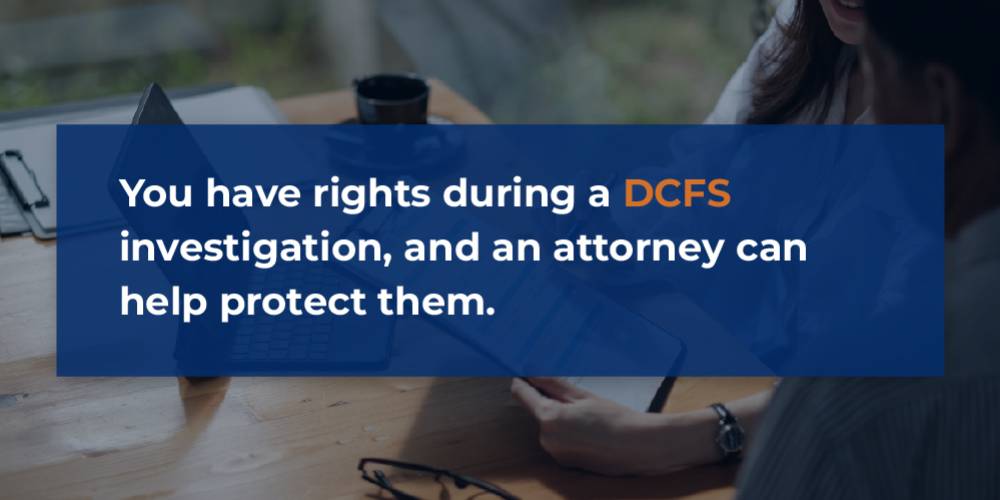Free Initial Consultations
 630-580-6373
630-580-6373With offices in Naperville, Joliet, Wheaton, Plainfield & Chicago
 There are a number of reasons a neighbor may call the Department of Children and Family Services (DCFS) on you. Regardless of the motivation, once a call about possible child abuse or neglect is made, DCFS must look into the matter. DCFS is the Illinois state agency responsible for protecting children from abuse and neglect, and it takes every hotline report seriously.
There are a number of reasons a neighbor may call the Department of Children and Family Services (DCFS) on you. Regardless of the motivation, once a call about possible child abuse or neglect is made, DCFS must look into the matter. DCFS is the Illinois state agency responsible for protecting children from abuse and neglect, and it takes every hotline report seriously.
For parents, getting a visit or phone call from DCFS is often frightening. So, what happens if DCFS is called on you? What rights do you have during the investigation process? Understanding how the system works can make the experience less intimidating. Our Wheaton, IL family attorney can help you avoid mistakes that could put your family at risk.
Under the Illinois Abused and Neglected Child Reporting Act, certain people, such as teachers, doctors, and social workers, are "mandated reporters" and must report suspected abuse or neglect. However, anyone, including neighbors, may also file a report if they believe a child is at risk.
Neighbors make DCFS reports for many reasons. Some are genuinely worried about a child’s safety and well-being, even if their concern is misdirected. Others may misinterpret a situation or act on incomplete information. Unfortunately, in some cases, people make calls out of spite, anger, or ongoing disputes. Whatever the reason, DCFS has to investigate.
When someone calls the hotline, DCFS reviews the information and decides if an investigation should begin. If so, a Child Protection Investigator (CPI) is assigned to your case. Elements of the investigation include:
Timeline: DCFS must assign a case within 24 hours of receiving the report. By law, investigators generally have 60 days to complete their work. In some situations, this deadline can be extended with approval from a supervisor.
Initial visit: The CPI will attempt to contact you, usually in person. They will want to interview both you and your child. They may also ask to speak with family members, teachers, medical professionals, or anyone else who has regular contact with your child.
Home conditions: Investigators may ask to see your home to check for safety concerns. While you should remain cooperative, remember that you are not required to let them inside without a warrant or court order.
The goal of DCFS is not always to remove children from a home. In many cases, they focus on assessing whether the child is safe and whether the family may benefit from additional services or support.
Parents often feel powerless when DCFS gets involved, but you still have important legal rights. You have the right to remain silent, meaning you do not need to answer every question, and you can politely decline until you have legal representation.
You also have the right to have an attorney present during interviews, which can help protect you from making statements that might later be misinterpreted. Unless DCFS arrives with a warrant or court order, you have the right to refuse entry into your home.
Parents facing a DCFS investigation often feel defensive or angry, especially if the report came from a neighbor with bad intentions. However, your actions during the investigation can affect the outcome.
Parents facing a DCFS investigation should:
Stay calm and respectful.
Say as little as possible until you speak with an attorney.
Take all accusations seriously, even if they seem false.
Keep notes about every visit and conversation.
Remember your boundaries. Investigators cannot search without proper authority.
Be prepared to answer questions about your parenting practices.
Request an interpreter if you are a non-English speaker.
At the end of an investigation, DCFS can issue one of three findings: unfounded, indicated, or undetermined. An unfounded finding means there was no credible evidence of abuse or neglect. The case is closed, and while DCFS keeps a record for a short time, it does not appear on your criminal record.
An indicated finding means DCFS believes there is credible evidence to support the claims. This can lead to your name being placed on the Illinois State Central Register under 325 ILCS 5/7.14, which schools and child care centers use in hiring decisions. Being listed can affect jobs, foster care, or adoption. Parents have the right to challenge this decision, and under 325 ILCS 5/7.16, you can request a hearing.
An undetermined finding means DCFS could not prove or disprove the report. Afterward, the case is closed, but the report stays in DCFS records for a set period. While it does not carry the same consequences as an indicated finding, it may be reviewed if future reports are made about your family.
In some cases, DCFS recommends voluntary services such as counseling, parenting classes, or referrals to community programs. While these services are designed to support families, you want to review them carefully with your attorney before agreeing to anything. Accepting help may be beneficial, but in certain cases, it could also be viewed as admitting that a problem exists.
A lawyer experienced with DCFS investigations can advise you on whether to accept services. They will also protect your rights during interviews and ensure that investigators do not overstep their authority. If an appeal becomes necessary, your attorney who is already familiar with your case will be ready to present a strong defense.

Accusations of abuse or neglect are always serious, even when they are unfounded. If a neighbor has called DCFS on you, do not wait for things to get worse. A skilled Wheaton, IL DCFS investigations lawyer at Davi Law Group can provide resources and insight on what to expect when DCFS comes knocking on your door.
Attorney Dion U. Davi has unique experience from his years as an Assistant State’s Attorney in DuPage County. He knows how prosecutors think and uses that insight to defend parents. Do not hesitate to get the support you need. Call 630-657-5052 to set up a free consultation.
